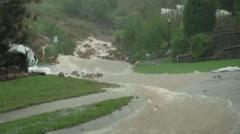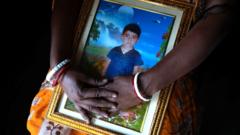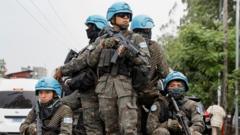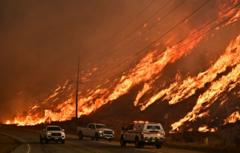Cyclone Chido has wreaked havoc in Mayotte, resulting in significant loss of life and widespread damage, as residents struggle to access basic necessities like food and water. French authorities begin rescue operations and pledge assistance.**
Mayotte Faces Catastrophic Aftermath as Cyclone Chido Strikes**
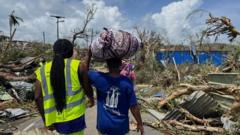
Mayotte Faces Catastrophic Aftermath as Cyclone Chido Strikes**
Residents of Mayotte describe 'apocalyptic scenes' after Cyclone Chido devastates the French Indian Ocean territory, claiming lives and leaving thousands without essential supplies.**
Residents of Mayotte are grappling with the aftermath of Cyclone Chido, the most devastating storm to hit the French Indian Ocean territory in nearly a century. The cyclone, which brought winds exceeding 225 km/h (140 mph), has left neighborhoods severely flattened, where many of the island's poorest inhabitants lived in makeshift structures with sheet-metal roofs.
"We have been without water for three days now," shared a resident from the capital city of Mamoudzou. Another added, "Some neighbors are starving and dehydrated." In response, French President Emmanuel Macron indicated his intention to visit Mayotte soon, reaffirming his commitment to provide support to local citizens, emergency services, and rescue teams actively engaged in recovery operations.
At least twenty fatalities have been confirmed so far, though local officials caution that the death toll may soar into the hundreds or even thousands as search and rescue efforts continue among the debris. Macron has announced plans for a national day of mourning, recognizing the tragedy that has profoundly affected the nation. Complicating matters further, authorities are struggling to accurately quantify casualties due to the prevalence of undocumented immigrants in the area—over 100,000 individuals within a total population of 320,000.
With infrastructure severely impacted—power lines down and roads rendered impassable—rescue operations face monumental challenges. Although emergency supplies are beginning to reach the island, many areas are still confronted with acute shortages of food, clean water, and adequate shelter. A staggering 85% of the territory remains without electricity, and only about 20% of cell phone services are functioning, while some regions have seen a return of tap water.
Midwife Amalia Mazon, working at the central hospital, expressed her concern, stating, "The water here is entirely yellow; it is not safe for us to drink." She voiced feelings of being neglected, with little information regarding impending assistance, affirming, "We feel utterly deserted."
The French acting health minister, Geneviève Darrieussecq, acknowledged the cyclone's toll on the healthcare system, already compromised before the disaster. Mayotte, a territory that has been under French administration since 1841, faces long-standing issues of poverty and unemployment, with about 75% of the population living below the national poverty level.
"Images from the island are catastrophic; it’s an utter disaster, and the remnants are almost non-existent," a nurse working in Mamoudzou recounted during an interview. John Balloz, a local resident, expressed disbelief at his survival through the storm, stating, "It's astonishing to see such extensive damage—everywhere needs rebuilding."
Senator Salama Ramia from Mayotte highlighted her concerns for the vulnerable, particularly those lacking food and water since the cyclone hit.
The prefect of Mayotte, François-Xavier Bieuville, warned that the eventual toll could be alarming once the devastation is fully assessed. He emphasized the profound impact on the island's impoverished communities, particularly the undocumented migrants who often live in precarious conditions.
To facilitate the rescue efforts, French Interior Minister Bruno Retailleau announced the deployment of additional troops, including 110 French soldiers already on the ground and another 160 on the way, along with a substantial number of volunteers assisting local law enforcement. Coordinated relief operations are being directed from Reunion Island, another French territory.
With over 200 Red Cross volunteers in the region, the situation is described as "chaotic." Red Cross spokesman Eric Sam Vah expressed deep concerns over the lack of communication, revealing that only 20 volunteers had been contacted.
In addition to the devastation in Mayotte, Cyclone Chido also caused significant destruction as it passed over Mozambique, where three fatalities have been reported and numerous buildings were damaged.
As search and rescue operations progress, experts continue to study the cyclone's intensity, with reports linking its rapid strengthening to long ocean exposure and climate change. Currently downgraded to a depression, the cyclone is expected to bring additional rainfall as it moves towards southern Africa.


